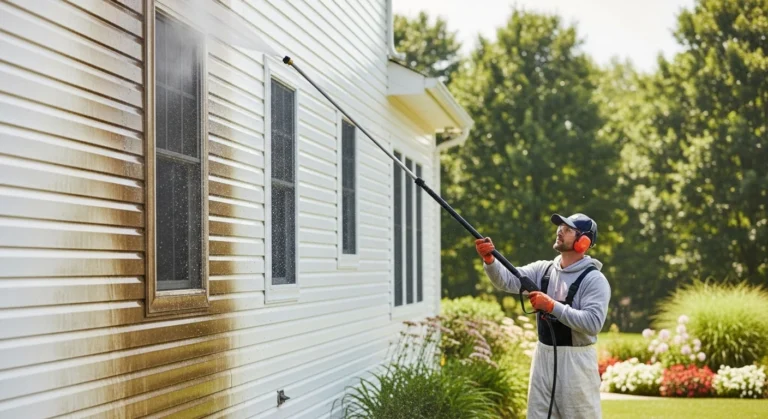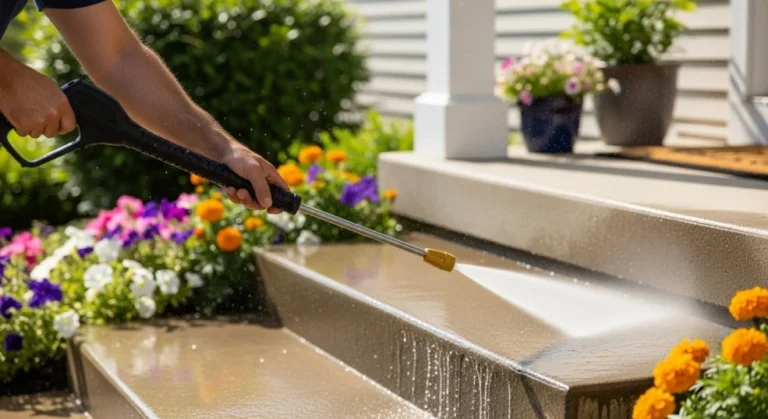Pressure washing and soft washing both are the exterior cleaning methods. They differ only in their approach. Both methods claim glittering results, they do not act the same and thus, cannot be applied in the same cleaning scenarios.
This guide compares pressure washing and soft washing systems in detail to reveal the major differences between them. You will find out which process suits you better according to your cleaning requirements and your type of property. We will discuss the science behind every method and what the difference is between pressure washing and softwashing.
What is Pressure Washing?
Pressure washing involves water jetting to scrub off the dirt, grime, and tough stains from surfaces. The devices produce between 1,300 and 4,000 pounds per square inch (PSI) of water. This strong power ruins the already settled garbage as well as removes years of stained pollution effectively.
The majority of pressure washers warm up water to approx 180-200 degrees F, to provide a greater cleaning ability. This is a very strong cleaning system because the hot water is combined with high pressure. Even the most complicated cleaning tasks can be addressed by professional-grade equipment at a breathtaking pace and efficiency.
What is Soft Washing?
Soft washing is performed using both special cleaning solutions and low pressure in applying water on the exterior surfaces. It utilizes a much lower pressure of 100-300 PSI as compared to pressure washing. Chemical solutions get the hard work done of decomposing organic materials such as algae, molds, and mildew.
The cleaning activity is associated with the use of biodegradable detergents, penetrating the depth of the material in the porous surface and crevices. The solutions also remove contaminants, not just by blowing them away with force. Low-pressure rinse can be used to wash away loosened debris without any danger of damage occurring to sensitive materials or architectural details.
Key Differences Between Pressure Washing and Softwashing
Pressure Levels and Force Application
- Pressure washing provides 1,300-4,000 PSI aggressiveness with water pressure.
- Soft washing light pressure (100-300 PSI) guarantees no damage to the surfaces and is non-destructive to the materials.
- High-pressure systems cannot operate as quickly on soft ground, but will etch or crack easily with soft material.
- The low-pressure tactics are slower and offer less damaging cleaning to fragile surfaces and finishes.
- Depending on the type of surface and the level of surface contamination, professional users regulate the amount of pressure.
Cleaning Solutions and Chemical Usage
- Pressure washing is normally based on the water pressure or simple detergents as its cleaning power.
- Soft washing involves the application of special biocides, surfactants, and cleaning agents to wash away all the contamination.
- Soft washing uses chemical solutions on different forms of organic growth and stains.
- Chemicals of pressure washers are usually gentle and target at increase the cleaning capabilities of water.
- The soft washing solutions offer sustainable results since they remove the root causes of contamination.
Best Applications for Pressure Washing
The pressure washing is most reliable when cleaning hard and durable surfaces, which do not easily come off during high-pressure water applications. The concrete driveways, sidewalks, and parking lots are also very receptive to intense pressure washing approaches. The high-pressure water hits the oil stains and tire marks as well as deeply embedded dirt particles.
Pressure washing is good on brick and stone surfaces where much contamination or graffiti is to be removed. The strong water pressure can be directed to metal surfaces such as aluminum siding and steel buildings. The durability of pool decks, patios, and outdoor furniture is functional by cleaning with the use of pressure washing.
Best Applications for Soft Washing
Soft washing is suitable for delicate surfaces that would be destroyed when a strong jet of water is used. Roof cleaning needs to use soft methods to prevent the uplift of shingles or pushing water beneath the roofing materials. Soft washing is an effective but gentle technique used on painted surfaces, stucco, and vinyl siding.
Wooden decks, fences, and other outdoor structures should be cleaned carefully to avoid splintering and other types of surface damage. The soft washing process is useful in eliminating organic growths such as moss, algae, and lichens on these surfaces. Screens, windows, and other delicate parts of the architecture must be soft-washed to retain their structure and beauty.
Benefits of Pressure Washing
The cleaning impact of pressure washing is efficient and quick, preventing the wastage of time during large-scale cleaning. The stubborn stains and contaminants are eliminated by the high-pressure water, which the manual cleaning procedures are unable to cope with. The equipment is fairly simple to set up, and little preparation in the use of chemicals or preparation is needed in the cleaning of the equipment.
The pressure washing is cost-effective to be used in case of routine cleaning purposes on hard surfaces such as concrete and brick. The visual outcomes are immediate and bring satisfaction and obvious proof of the efficiency of the cleaning system. The majority of residential property owners should have access to renting or buying pressure washing machines in order to do their periodic cleaning.
Benefits of Soft Washing
Soft washing has more lasting outcomes because it cleans the causes of the contamination instead of cleaning the surface. This soft method will not harm sensitive surfaces, architectural elements, and plantings near the site of cleaning. After application, chemical solutions keep working continually, offering long-term protection against further contamination and organic growth.
The environmental impacts are that less water is used as opposed to other high-pressure cleaning techniques, which demand endlessly running water. The directed cleaning will enable exact cleaning of the problem areas without any damage to the surrounding surfaces. The effectiveness of the method normally leads to assurances on the quality of work by professional soft washing services.
Transform Your Property with the Right Cleaning Method
The differences between pressure and soft washing allow you to decide on cleaning effectively. There are unique benefits attributed to each cleaning technique that make it appropriate to various cleaning challenges and surfaces. The trick is to use the appropriate method to clean around your particular cleaning needs and the needs of your property.
Before picking a method to clean up your property, take time to evaluate the surfaces of your property and the contamination on your property. Consider taking professional cleaning contractors to assess your case and advise on the most effective method. Investing in appropriate exterior cleaning will make your property look better, increase in value, and have a longer lifespan. Read Related topic: Why Professional Exterior Cleaning Beats DIY Every Time


